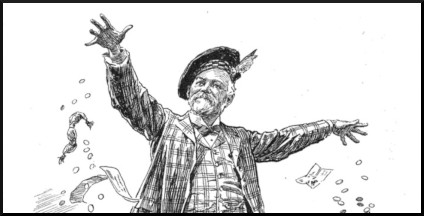Andrew Carnegie? Apocryphal?

Question for Quote Investigator: U.S. business titan and philanthropist Andrew Carnegie apparently placed great value on psychological techniques such as envisioning success and using affirmations. He believed that one could obtain “immense power” via “secret reveries”. Would you please help me to find a citation?
Reply from Quote Investigator: In 1885 Andrew Carnegie addressed the graduating class of Curry Commercial College in Pittsburg, Pennsylvania. He encouraged the students to pursue the highest positions in society. Emphasis added to excerpts by QI:1
Assuming that you have all obtained employment and are fairly started, my first advice to you is “aim high” I would not give a fig for the young man who does not already see himself the partner or the head of an important firm. Do not rest content for a moment in your thoughts as head clerk, or foreman, or general manager in any concern, no matter how extensive. Say each to yourself, “My place is at the top.”
Be king, in your dreams. Immense power is acquired by assuring yourself in your secret reveries that you were born to control affairs. Be fully satisfied that you are intended by nature for a millionaire, an honest, useful millionaire; every poor young man is. I see the first unmistakeable mark of millionairship upon every one of you in the certificates you have just won. Make your vow that you will reach that position with untarnished reputation . . .
Below are additional selected citations in chronological order.
In 1906 Carnegie published the collection of essays “The Empire of Business”, and he included a piece based on his 1885 speech at “Curry Commercial College”, Interestingly, the revised text omitted the sentence referring to “secret reveries”:2
Say each to yourself. “My place is at the top.” Be king in your dreams. Make your vow that you will reach that position, with untarnished reputation, and make no other vow to distract your attention . . .
The 1902 book “Leaders of Men: Or, Types and Principles of Success” edited by Henry W. Ruoff included a chapter about Carnegie which reprinted the quotation:3
“Immense power is acquired by assuring yourself in your secret reveries that you were born to control affairs.”—Curry Commercial College, Pittsburg, June 23, 1885.
Shortly after Carnegie’s death in 1919, “The Boston Globe” of Massachusetts printed a set of “pithy sayings” ascribed to him. Here were three:4
On Success—Immense power is acquired by assuring yourself in your secret reveries that you were born to control affairs.
On Temperance—The first and most seductive peril and the destroyer of most young men is the drinking of liquor.
On Recreation—I hope Americans will some day find more time for play, like their wiser brethren on the other side. As a Nation, we Americans are inclined to take everything, including ourselves, too seriously.
In 1937 the journalist and magazine founder B. C. Forbes printed the saying in his quotation collection “Thoughts on the Business of Life”.5
In 1982 journalist and pundit William Safire included the remark in his collection “Good Advice”; however, he placed the statement in a section called “Questionable Advice”.6
In conclusion, Andrew Carnegie should be credited with the line he delivered in 1885. The statement fits into the self-help paradigm of cultivating positive thoughts.
Image Notes: Cartoon of Andrew Carnegie from May 29, 1901 issue of “Punch, Or The London Charivari”, Page 395. Image acquired from Google Books database. Image has been cropped and resized.
Update History: On April 5, 2025 the format of the bibliographical notes was updated.
- 1885, Booklet: Address to the Students of the Curry Commercial College Delivered at Liberty Hall Pittsburg by Andrew Carnegie on June 23, 1885, Quote Page 6, Published by Curry Commercial College, Pittsburg, Pennsylvania. (Note: Page images were appended to “Intereses de Bilbao, 1837” in Google Books Database on May 15, 2019) (Google Books Full View) link ↩︎
- 1906 (1902 Copyright), The Empire of Business by Andrew Carnegie, The Road To Business Success: A Talk To Young Men, (From an address to Students of the Curry Commercial College, Pittsburg, June 23, 1885), Start Page 2, Quote Page 4, Harper & Brothers, London and New York. (Google Books Full View) link ↩︎
- 1903 (1902 Copyright), Leaders of Men: Or, Types and Principles of Success, Edited by Henry W. Ruoff, Chapter 24: Andrew Carnegie, Quote Page 521, The King-Richardson Company, Springfield, Massachusetts. (Google Books Full View) link ↩︎
- 1919 August 11, The Boston Globe, Some Pithy Sayings in Which Carnegie Expressed His Wisdom, Quote Page 8, Column 4, Boston, Massachusetts. (Newspapers_com) ↩︎
- 1937 Copyright, Thoughts on the Business of Life, Edited by B. C. Forbes, Quote Page 26, B.C. Forbes Publishing Company, New York. (Verified with scans) ↩︎
- 1982, Good Advice, Compiled by Leonard Safir and William Safire, Section: Questionable Advice, Quote Page 282, Published by NYT Times Books, New York. (Verified on paper) ↩︎